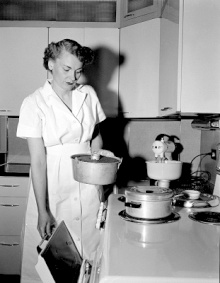
Back اقتصاد منزلي Arabic Economia domèstica Catalan Economeg y cartref Welsh Hjemkundskab Danish Haushaltswissenschaft German Hejma ekonomio Esperanto Economía doméstica Spanish Kodundus Estonian Etxeko ekonomia Basque اقتصاد خانه Persian


Home economics, also called domestic science or family and consumer sciences (often shortened to FCS or FACS),[1] is a subject concerning human development, personal and family finances, consumer issues, housing and interior design, nutrition and food preparation, as well as textiles and apparel.[2] Much less common today, it was, and is, mostly taught in secondary school or high school.
Home economics courses are offered around the world and across multiple educational levels. Historically, the purpose of these courses was to professionalize housework, to provide intellectual fulfillment for women, to emphasize the value of "women's work" in society, and to prepare them for the traditional roles of sexes.[3][4] Family and consumer sciences are taught as an elective or required course in secondary education, as a continuing education course in institutions, and at the primary level.
Beginning in Scotland in the 1850s, it was a woman-dominated course, teaching women to be homemakers with sewing being the lead skill. The American Association of Family and Consumer Sciences at the beginning of the 20th century saw Americans desiring youth to learn vocational skills as well. Politics played a role in home economics education, and it wasn’t until later in the century that the course shifted from being woman-dominated to now required for both sexes.[2]
Now family and consumer science have been included in the broader subject of Career Technical Education, a program that teaches skilled trades, applied sciences, modern technologies, and career preparation.[5] Despite the widening of the subject matter over the past century, there has been a major decline in home economics courses offered by educational institutions.[6]
- ^ "What is Family & Consumer Sciences?". MAFCS. Archived from the original on 2023-03-07. Retrieved 2023-03-08.
- ^ a b "FAQ". American Association of Family and Consumer Sciences. Archived from the original on 2015-01-11. Retrieved 2015-01-11.
- ^ Danovich, Tove (June 14, 2018). "Despite A Revamped Focus On Real-Life Skills, 'Home Ec' Classes Fade Away". NPR. Archived from the original on November 16, 2020. Retrieved November 14, 2020.
- ^ Elias, Megan (January 2006). ""Model Mamas": The Domestic Partnership of Home Economics Pioneers Flora Rose and Martha Van Rensselaer". Journal of the History of Sexuality. 15 (1): 65–88. doi:10.1353/sex.2006.0052. JSTOR 4617244. S2CID 142247487.
- ^ "Career and Technical Education Definition". The Glossary of Education Reform. 2013-05-15. Archived from the original on 2019-08-07. Retrieved 2021-04-03.
- ^ Noddings, Nel (2013). Education and Democracy in the 21st Century. Teachers College Press. ISBN 978-0807753965. Archived from the original on 2022-12-19. Retrieved 2020-10-26.
© MMXXIII Rich X Search. We shall prevail. All rights reserved. Rich X Search